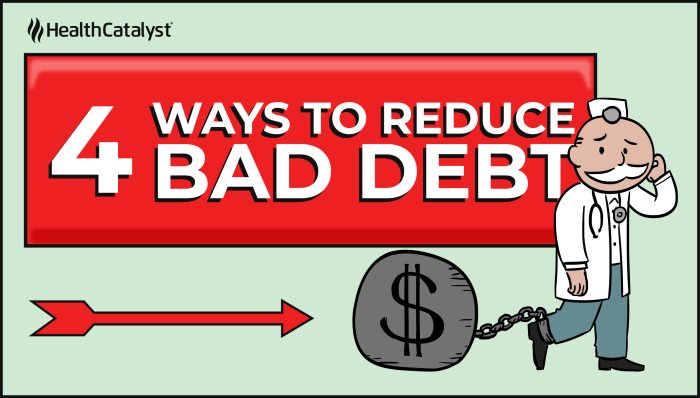Are you tired of drowning in debt and ready to take control of your finances? Learning how to avoid bad debt is the first step towards a brighter financial future. From understanding the causes of bad debt to implementing strategies for financial success, this guide will equip you with the tools you need to stay debt-free.
In this comprehensive guide, we will explore practical tips for managing your expenses, building a strong financial foundation, and using credit cards responsibly to steer clear of bad debt pitfalls.
Understanding Bad Debt
Bad debt is money that is borrowed and not repaid, resulting in financial losses for the borrower. This can have serious implications on personal finances, leading to damaged credit scores, high interest rates, and even legal action.
Common causes of bad debt include overspending, unexpected expenses, job loss, and poor financial management. It can also result from borrowing money for non-essential items or using credit cards irresponsibly.
Difference Between Good Debt and Bad Debt
Good debt is typically used to finance investments that can increase in value over time, such as a mortgage for a home or student loans for education. This type of debt can be considered an investment in one’s future.
On the other hand, bad debt is incurred for items that do not retain value or generate income, such as high-interest credit card debt for luxury purchases or loans for vacations. Unlike good debt, bad debt can lead to financial instability and long-term consequences.
Tips for Avoiding Bad Debt
Avoiding bad debt is crucial for maintaining financial stability and peace of mind. Here are some effective strategies to help you manage your expenses, track your spending habits, and prioritize debt repayments.
Create a Realistic Budget
Creating a budget is the foundation of managing your finances effectively. Start by listing all your sources of income and fixed expenses, such as rent, utilities, and loan payments. Allocate a specific amount for variable expenses like groceries, entertainment, and transportation. Make sure your expenses do not exceed your income to avoid accumulating debt.
Track Your Spending Habits
Tracking your spending habits is essential to prevent overspending and identify areas where you can cut back. Use apps or spreadsheets to monitor your expenses and categorize them. Review your spending regularly to see if you are staying within your budget and make adjustments as needed to avoid going into debt.
Prioritize Debt Repayments
If you have multiple debts, prioritize repayments based on interest rates and outstanding balances. Consider paying off high-interest debts first to reduce the amount of interest you accumulate over time. Make minimum payments on all debts to avoid penalties, but focus on paying extra towards the debt with the highest interest rate to eliminate it faster and prevent further debt accumulation.
Building a Strong Financial Foundation

Building a strong financial foundation is crucial in avoiding bad debt situations and achieving financial stability. By focusing on key aspects like emergency funds, financial goals, and credit scores, individuals can set themselves up for success in managing their finances effectively.
The Significance of Emergency Funds
Having an emergency fund is essential to prevent falling into debt when unexpected expenses arise. It acts as a safety net, providing financial security during challenging times. Emergency funds should ideally cover 3 to 6 months’ worth of living expenses to ensure financial stability in times of crisis.
Benefits of Setting Financial Goals and Creating a Long-Term Financial Plan
Setting financial goals helps individuals stay focused and motivated to improve their financial situation. Whether it’s saving for a home, retirement, or education, having clear objectives can guide financial decisions and keep spending in check. Creating a long-term financial plan helps in mapping out steps to achieve these goals and ensures financial well-being in the future.
The Role of Credit Scores in Managing Debt
Credit scores play a vital role in managing debt and overall financial health. A good credit score can help individuals secure favorable interest rates on loans and credit cards, while a poor credit score can lead to higher costs and limited access to credit. Monitoring and maintaining a healthy credit score is crucial in managing debt effectively and working towards financial stability.
Responsible Credit Card Usage
Using credit cards wisely is crucial for avoiding bad debt and maintaining a healthy financial profile. It’s important to understand the terms and conditions of your credit card to make informed decisions. Here are some best practices for responsible credit card usage:
Understanding Credit Card Terms and Conditions
Before using a credit card, take the time to read and understand the terms and conditions. Pay attention to interest rates, fees, grace periods, and any other important details that may impact your finances.
Choosing the Right Credit Card
When selecting a credit card, consider factors such as annual fees, rewards programs, and interest rates. Choose a card that aligns with your spending habits and financial goals to maximize its benefits.
Managing Credit Limits Responsibly
It’s essential to manage your credit limits responsibly to avoid overspending and accumulating debt. Keep track of your expenses, set a budget, and never exceed your credit limit to maintain a healthy credit score.
